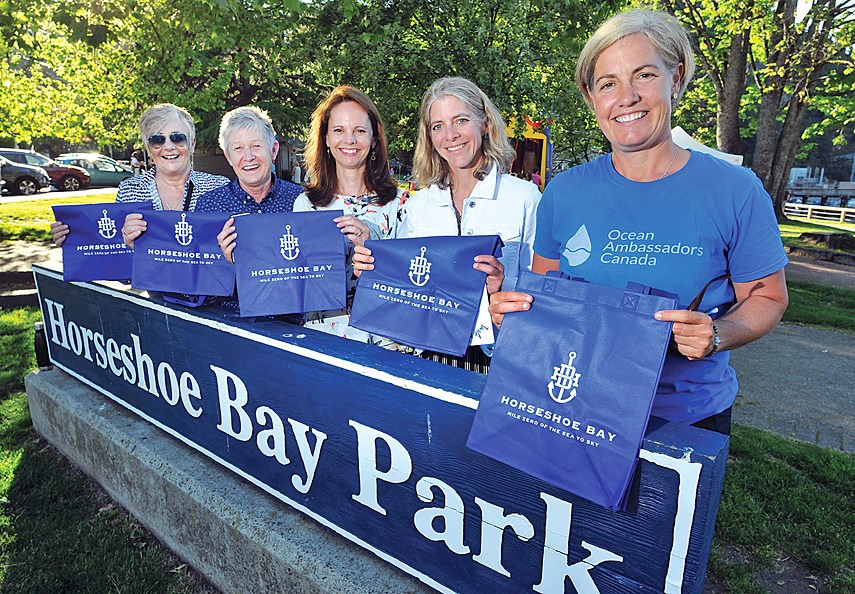It may cost a little bit more, but it could help save the planet immeasurably.
Horseshoe Bay in West Vancouver is striving to ditch plastic bags. Following a joint initiative between Ocean Ambassadors Canada and the Horseshoe Bay Business Association, 28 of the seaside village’s 35 businesses have pledged to switch away from single-use plastic bags in favour of offering consumers paper or reusable ones.
“We think that although legislation is a really great solution, it’s going to be much too slow and that we need to have business communities and by association, the community members, to be leaders in this,” said Alison Wood, co-founder of Ocean Ambassadors Canada, a North Shore-based organization dedicated to combating the scourge of plastic garbage in oceans through education as well as local environmental initiatives.
Visitors to Horseshoe Bay will notice the majority of businesses now sport stickers stating “This business is proudly plastic bag free!” following informal agreements that local businesses made with Ocean Ambassadors Canada.
“What we’re hoping is to get everybody using the reusable bags,” said Wood. “We can create a lot of change by just showing that leadership and not waiting for legislation.”
Ocean Ambassadors Canada, which was founded in 2017, first made a splash last year after the organization was part of merchant-led initiative in Deep Cove to become the first neighbourhood in Metro Vancouver to go plastic straw-free.
“If you choose to live in Horseshoe Bay, I think there’s almost always a real connection with nature. As far as initiatives that can gain momentum, we felt like that Deep Cove and Horseshoe Bay are the two easiest ones,” said Wood.
Noting the slight increase in cost of purchasing paper bags versus plastic ones, the Horseshoe Bay Business Association is looking at absorbing some of the costs of bulk purchasing paper bags for member businesses, according to Holly Kemp, general manager at Troll’s Restaurant and the president of the business association.
“It does make a difference to the bottom line, but we as Troll’s and also the Horseshoe Bay Business Association are willing to put some money into supporting the change for the other businesses,” said Kemp. “I think it would be appropriate for success within a smaller village where there’s only 35 businesses. We could make a tiny impact onto the world if we all put this thought process into place, which we did.”
While more than a thousand paper bags have already been supplied to businesses to help them switch over and get started, Wood and Kemp said both organizations are currently working on a bulk purchase of Horseshoe Bay-branded reusable bags that businesses will hopefully be able to supply soon.
For Wood especially, communities switching away from single-use plastics can’t happen soon enough. “Having the support of the community is really important,” she said.
Findings from a new study out of Dalhousie University released this week show that almost 94 per cent of Canadians are motivated to reduce single-use plastic food packaging, though only 56 per cent report actively shopping for food with non-plastic packaging. The study also finds that 71 per cent of Canadians support a ban on all single-use plastics used for food packaging.
The report also recommends encouraging a voluntary phasing-out of plastic bags.
Meanwhile, new research from the University of Victoria finds that people inadvertently consume tens of thousands of microplastic particles every year. A lot of research into plastic waste and microplastics has so far focused on how it affects oceans and bodies of water.
“Our goal is to connect young people with the ocean and inspire them to care for it,” said Wood, on Ocean Ambassadors Canada’s didactic goals in addition to its environmental initiative work. “The concept is that if we want the next generation to really care about the ocean and make a difference in the environment, they have to feel connected to it.”



